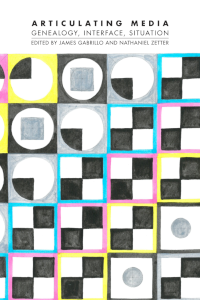Articulating Media: Genealogy, Interface, Situation, edited by James Gabrillo and Nathaniel Zetter
 Tuesday, March 7, 2023 at 9:48AM
Tuesday, March 7, 2023 at 9:48AM Open Humanities Press is pleased to announce the publication of Articulating Media: Genealogy, Interface, Situation, edited by James Gabrillo and Nathaniel Zetter.
Like all Open Humanities Press books, Articulating Media is available open access (it can be downloaded for free):
http://www.openhumanitiespress.org/books/titles/articulating-media/
Book description:
To ‘articulate’ media means to understand them by locating their connections in space and time. Articulating Media offers new approaches to the writing of technology and the technologies of writing by twinning an investigation of language with an attention to location. Where does media theory take place? How should media theory understand its own occupation of the spaces of media? What materialities might survive media’s many articulations and associations?

Diverse in topic and method, the collection’s nine chapters analyse those questions of value, representation, and categorisation that are held within the languages of media. Contributors consider media technologies – following previous volumes in the Technographies series – not as mute objects addressed through language, but as processes and devices situated in the very grammars and vocabularies of their address. Scholars of literature, film, musicology, art, design theory, and media history evaluate new linguistic possibilities for thinking across disciplines and for considering the significance of location to media-critical writing. Collectively, the book traces the ways in which media vernaculars have shaped the vernaculars of media theory, and proposes a few ways in which we might reshape them.
Editor Bios
James Gabrillo is an assistant professor of musicology and ethnomusicology at the University of Texas at Austin. He was previously a lecturer at The New School and a postdoctoral fellow at Princeton University.
Nathaniel Zetter is a College Teaching Associate in English at Selwyn College, University of Cambridge.
Series
Articulating Media is published as part of the Technographies series, edited by Steven Connor, David Trotter and James Purdon:
http://www.openhumanitiespress.org/books/series/technographies/
 Gary Hall | Comments Off |
Gary Hall | Comments Off | 





